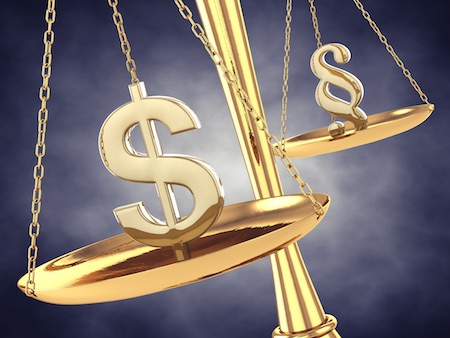 A freelance photographer walks down the street and sees one of her photos hanging in a window. At first, her heart swells with pride. But she’s also confused: she never sold her work to the owner. So, who’s making money off of it?
A freelance photographer walks down the street and sees one of her photos hanging in a window. At first, her heart swells with pride. But she’s also confused: she never sold her work to the owner. So, who’s making money off of it?
If our legal system worked properly, it would be easy enough for her to file for copyright infringement. But under our current claims system, high litigation costs make it almost impossible for authors, writers and artists to protect their livelihoods in court.
Independent creators are frequent victims of piracy and other forms of copyright infringement. But without the resources of a record company or publisher, pursuing small claims is financially impossible. The American Intellectual Property Association’s 2015 survey found that the average cost of litigating a copyright case with less than one million dollars at stake was $278,000. That’s not money most freelance writers and artists have lying around.
Fortunately, there’s a bipartisan policy fix pending in Congress. It’s called the CASE Act (H.R. 3945), and it creates a system that makes pursuing small claims financially and logistically feasible. The legislation would set up tribunals of copyright experts that review infringement claims while allowing independent creators to avoid an expensive legal battle.
The CASE Act doesn’t replace our current claims system. In some cases, the parties will bypass the tribunals altogether. But in a substantial number of cases, the tribunals will level the playing field between wealthy companies and independent creatives.
The legislation puts impartial copyright experts in charge of copyright disputes. Today, copyright infringements are litigated in the courts. Judges review the evidence and issue a ruling. Tribunals set up under the CASE Act would be adjudicated by three Copyright Claims Officers – two of whom have represented both owners and users of copyrighted works. The officers are strictly required to follow judicial precedent, and are therefore ultimately accountable to the courts.
Only small claims would fall under the tribunal’s purview. In fact, damages are capped at $15,000 per work infringed, and $30,000 in total. That’s a far lower ceiling than the $150,000 plaintiffs can seek in federal court. The cap means high stakes cases will continue to be adjudicated in court. For cases that don’t merit hundreds of thousands of dollars in legal fees and damages, the tribunal provides a more specialized, appropriate venue for legal remedy.
Ultimately, it’s consumers who benefit from robust copyright protections. A protected market means more creators who can afford to keep producing the books, paintings, music, photographs, and other art enjoyed by the general public. It’s difficult to imagine that emerging artists would ever build an audience if their work was always in danger of being ripped off.
Some of the bill’s opponents imagine the tribunals threaten due process by providing an alternative to the courts. They overlook a singularly important detail: participation in these tribunals is voluntary. Claimants and defendants must first consent, and since both have an interest in avoiding legal expenses, they will often choose to do so.
Besides, such criticisms ignore the due process concerns raised by our current system. Today, the expense of our judicial system bars most claimants from the copyright protections guaranteed to them by law. Effectively, wealthy claimants enjoy rights that less wealthy claimants do not – a clear violation of the equal protection principle. When legal remedy is a privilege reserved for the rich, there can be no due process.
Because claimants and defendants can take copyright disputes to court – opting out of the tribunal system – some speculate that large companies will use the threat of high legal costs to coerce consent to the small claims process. Unfortunately, companies already have that ability. The addition of a voluntary tribunal merely provides a less expensive option: one that gives writers, artists and academics a better chance of defending their livelihoods.
The promise of living in a just and democratic society is that one’s rights are not conditional on any quality: race, religion, and financial ability among them. The right to vote is meaningless if a poll tax excludes poor voters. So is copyright law, if only wealthy companies can afford to participate in the legal system. In pursuit of a fairer society, we ought to take procedural barriers to justice as seriously as unjust laws.

![[IPWatchdog Logo]](https://ipwatchdog.com/wp-content/themes/IPWatchdog%20-%202023/assets/images/temp/logo-small@2x.png)

![[Advertisement]](https://ipwatchdog.com/wp-content/uploads/2024/04/Patent-Litigation-Masters-2024-sidebar-early-bird-ends-Apr-21-last-chance-700x500-1.jpg)

![[Advertisement]](https://ipwatchdog.com/wp-content/uploads/2021/12/WEBINAR-336-x-280-px.png)
![[Advertisement]](https://ipwatchdog.com/wp-content/uploads/2021/12/2021-Patent-Practice-on-Demand-recorded-Feb-2021-336-x-280.jpg)
![[Advertisement]](https://ipwatchdog.com/wp-content/uploads/2021/12/Ad-4-The-Invent-Patent-System™.png)






Join the Discussion
3 comments so far.
Robert Bear
February 19, 2018 08:44 pmSeems like we are a long way from finding a solution that helps independent creators from becoming victims of piracy and copyright infringement.
Anon
February 18, 2018 08:58 amIs there as issue with Due Process, to which the consent from both parties is required?
If we take as true for argument’s sake the point from post 1 above, a question is provoked as to whether or not such dual consent is somehow a necessity.
M\ichael Zalll
February 17, 2018 07:55 amThe fact that both parties need to consent is a dead on arrival procedure. If I am an infringer and someone is asserting a small claim against me why would I agree to CASE? If he wants to use CASE it tells me he cannot afford a lawyer to bring a lawsuit in court or it’s not worth it to bring the action. Such small claims procedures need to function like a small claims court that exist throughout the US.